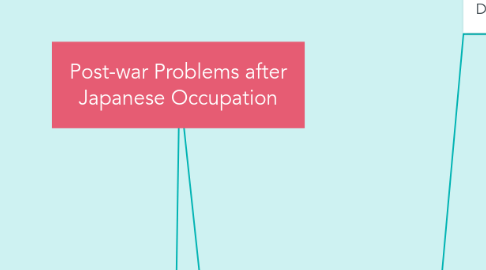
1. Physical problems
1.1. Food shortage
1.1.1. insufficient food due to disruption of trade
1.1.2. black market thrived, food continued to be sold at high prices
1.2. Job shortage / Unemployment
1.2.1. jobs were limited due to lack of trade and businesses
1.3. Housing shortage
1.3.1. houses were scarce
1.3.2. living conditions were cramped and overcrowded
1.3.3. rents were high due to shortage of housing
1.4. Education affected
1.4.1. many children did not attend school during Japanese Occupation
1.4.2. wanted to continue with education after British returned
1.4.3. but there were insufficient schools, teachers, textbooks to meet demands for education
1.5. Trade and businesses affected
1.5.1. trade was disrupted during the war
1.5.2. businesses needed time to recover
1.5.3. some students chose not to return to school and entered the workforce but jobs were limited for them
2. Psychological problems
2.1. Discontentment with the British
2.1.1. Workers were unhappy with their low wages and poor working conditions
2.1.1.1. workers joined trade unions which organized strikes to get employers to agree to their demands
2.1.1.2. more than 300 strikes involving 70000 workers held in 1947 alone, British had to call up troops to maintain law and order
2.1.2. Chinese middle school students felt they were treated unfairly by the British colonial government
2.1.2.1. British colonial government gave little support to the students and they had limited oppportunity to pursue education in Singapore. Those returning from China were banned to come to Singapore to stop the spread of communist ideas
2.1.2.2. British introduced National Service 1954 for males aged 18-20 and many Chinese middle school students were upset as their studies would be further disrupted
2.1.2.2.1. they were not willing to defend the colonial government, loyalty was not to the British
2.1.2.2.2. 13 May 1954 around 500 students held paceful demonstration against NS but British government ended the demonstration which resulted in a clash between students and the police.
2.1.2.2.3. Student demonstrations continued and students locked themselves up in Chung Cheng High school as part of their protest.
2.1.3. Maria Hertogh riots 1950
2.1.3.1. some Muslims were angry with the Supreme Court's ruling and felt that the British was unfair and had taken the side of the Dutch
2.1.3.2. led to riots where Europeans and Eurasians were attacked. Riots continued for 3 days, curfew lasted for two weeks and 18 people were killed while 173 others injured.
2.2. Demands for citizenship
2.2.1. Chinese Chamber of Commerce started a petition in 1951 for the British colonial government to grant citizenship to China-born Chinese immigrants over the age of 21
2.2.2. The China-born Chinese felt that they should also be treated and given the same privileges as the local-born Chinese as they have already made their homes in Singapore
2.2.3. they do not want to be regarded as aliens and want the same voting privileges and naturalisation papers to be certified as a citizen.
2.3. Demands for better treatment of local civil servants
2.3.1. After 1948, the colonial government recruited more locals into the civil service but the British officials continued to enjoy better pay and hold senior positions even though the locals were equally well-qualified.
2.3.2. Local civil servants opposed the British colonial government's unequal treatment of the locals and demanded that the government raise their pay.
2.4. Demands for local political involvement
2.4.1. there was a change in mindset and increased political consciousness and awareness among the people in Singapore after the Japanese Occupation.
2.4.2. political groups emerged, such as the Malayan Democratic Union (MDU), formed in 1945 comprising of mainly local-born, English-educated Chinese, Indians and Eurasians. Members of the MDU often discussed how they wanted to be governed.
